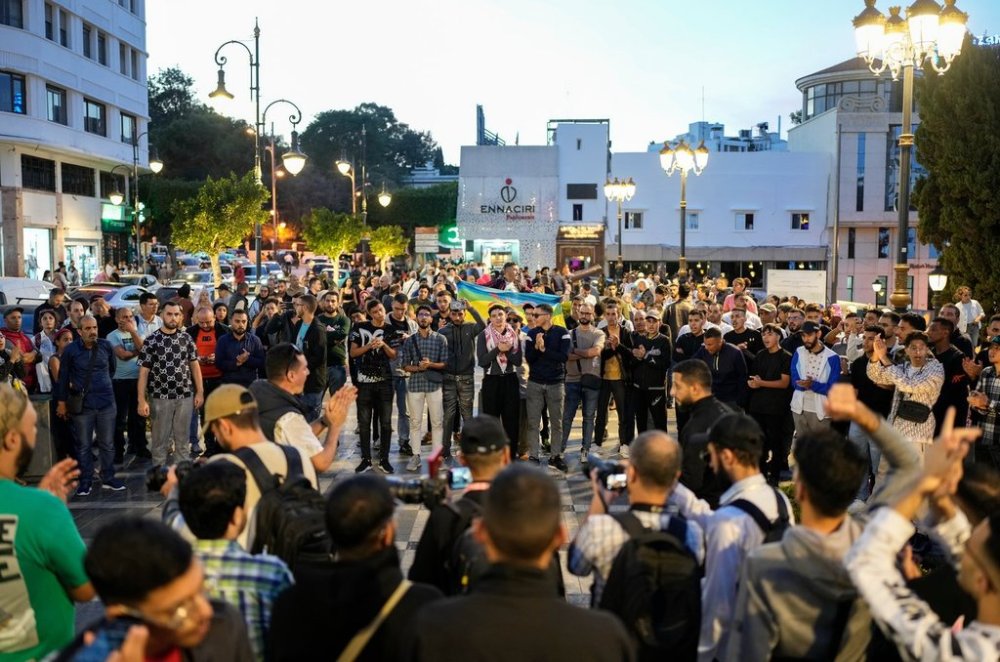World
Moroccan Youth Protest for Accountability and Education Reform

Protests erupted across Morocco as young demonstrators, organized by the grassroots movement Gen Z 212, called for accountability and educational reform. With the Africa Cup of Nations set to take place in December, protesters urged a boycott of soccer matches in newly constructed stadiums, emphasizing their dissatisfaction with government priorities that favor sports infrastructure over essential social services.
Demands for Reform and Accountability
On Saturday, hundreds of protesters took to the streets in cities including Casablanca and Tangier, reiterating previous demands for the release of those arrested during earlier demonstrations. Protesters voiced their discontent with the government, particularly targeting Prime Minister Aziz Akhannouch, whom they labeled corrupt. Their chants included, “Stadiums are here, but where are the hospitals?” highlighting the disparities in health and education services.
These demonstrations followed an eight-day pause and came after a speech by King Mohammed VI, who did not directly address the protests. While he emphasized the need for national projects and social programs to advance together, many interpreted his remarks as an indirect response to the protesters. The King stated, “There should be no contradiction or competition between major national projects and social programs,” reinforcing the government’s stance on prioritizing development.
Public Discontent and Educational Challenges
Demonstrators expressed their frustration over the quality of education, particularly in light of rising enrollment in private schools. According to government data, the number of students in private universities has surged over sixfold since 2000. Many protesters cited personal experiences, such as being unable to obtain necessary textbooks, as reasons for their involvement. “I’m done with school and studying, but I’m here demanding reforms for the generations to come,” one young protester stated.
The protests are fueled by a growing concern over educational policies that expand private school enrollment at the expense of public education. State audits have revealed significant teacher shortages and disparities in educational resources, particularly affecting rural areas. Despite government pledges to enhance education and healthcare funding, recent audits suggest these measures have yet to yield substantial improvements.
In a recent meeting with the World Bank, Finance Minister Nadia Fettah Alaoui highlighted the government’s commitment to reallocating funds to accelerate improvements in these sectors. This promise comes in the wake of a national outrage triggered by the tragic deaths of eight women during childbirth in a public hospital in Agadir.
The protests have drawn comparisons to movements in other countries, reflecting a broader call for social justice and reform. Following earlier demonstrations, which turned violent and resulted in casualties, authorities reported over 400 arrests related to vandalism and unrest. As protests continue, the younger generation remains undeterred in their pursuit of systemic change.
With the upcoming Africa Cup of Nations on the horizon, the Gen Z 212 movement is determined to maintain pressure on the government, advocating for a future where essential services take precedence over extravagant spending on sports infrastructure.
-

 Science3 months ago
Science3 months agoToyoake City Proposes Daily Two-Hour Smartphone Use Limit
-

 Health4 months ago
Health4 months agoB.C. Review Reveals Urgent Need for Rare-Disease Drug Reforms
-

 Top Stories4 months ago
Top Stories4 months agoPedestrian Fatally Injured in Esquimalt Collision on August 14
-

 Technology3 months ago
Technology3 months agoDark Adventure Game “Bye Sweet Carole” Set for October Release
-

 World3 months ago
World3 months agoJimmy Lai’s Defense Challenges Charges Under National Security Law
-

 Lifestyle4 months ago
Lifestyle4 months agoVictoria’s Pop-Up Shop Shines Light on B.C.’s Wolf Cull
-

 Technology3 months ago
Technology3 months agoKonami Revives Iconic Metal Gear Solid Delta Ahead of Release
-

 Technology3 months ago
Technology3 months agoApple Expands Self-Service Repair Program to Canada
-

 Technology3 months ago
Technology3 months agoSnapmaker U1 Color 3D Printer Redefines Speed and Sustainability
-

 Technology3 months ago
Technology3 months agoAION Folding Knife: Redefining EDC Design with Premium Materials
-

 Technology4 months ago
Technology4 months agoSolve Today’s Wordle Challenge: Hints and Answer for August 19
-

 Business4 months ago
Business4 months agoGordon Murray Automotive Unveils S1 LM and Le Mans GTR at Monterey









